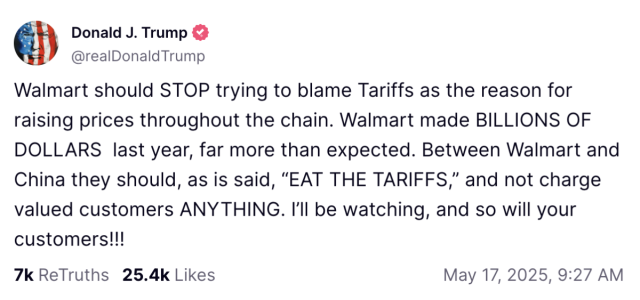Will retailers absorb Trump’s tariffs—or will shoppers pay? Treasury Secretary weighs in
By
Veronica E.
- Replies 0
If you’ve noticed prices creeping up on everyday purchases, you’re not alone.
A new round of tariffs on imported goods is prompting discussions about how those added costs will be handled—and whether they’ll affect what consumers pay at the register.
Retailers and policymakers are navigating competing priorities, with some in government urging businesses to absorb the increases.
But according to industry leaders, the situation is more complex than it may appear.
One of the nation’s largest retailers, Walmart, is already at the center of the conversation.
President Donald Trump announced a sweeping set of tariffs in early April, calling it “liberation day.”
The policy imposes higher taxes on imported goods from numerous countries, including many key trading partners.
The administration described the tariffs as a step toward improving trade agreements, though the announcement was followed by market fluctuations and concerns about potential price increases.

Walmart, a major importer of goods from countries like China, responded quickly.
On an earnings call last week, CEO Doug McMillon said, “We will do our best to keep our prices as low as possible, but given the magnitude of the tariffs, even at the reduced levels announced this week, we aren’t able to absorb all the pressure given the reality of narrow retail margins.”
Chief Financial Officer John Rainey added that the company is “wired for everyday low prices,” but the current tariffs are “more than any retailer can absorb.”
He said consumers can expect to see prices begin rising by the end of May and “certainly much more in June.”
Also read: What Walmart shoppers should know about expected price adjustments
White House pushes back
President Trump took to his Truth Social platform on Saturday, urging Walmart to “eat the tariffs and not charge valued customers anything.”
The following day, Treasury Secretary Scott Bessent said on NBC’s Meet the Press that Walmart had agreed to do just that—at least partially.
“I was on the phone with Doug McMillon, the CEO of Walmart, yesterday. And Walmart is, in fact, going to, as you describe it, eat some of the tariffs, just as they did in ‘18, ‘19, and ‘20,” Bessent said, referencing earlier rounds of trade policy during Trump’s first term.
However, a spokesperson for Walmart declined to comment on the conversation, and a source familiar with the call said the company’s position had not changed.
The call between McMillon and Bessent was reportedly scheduled days before Trump’s public comments.
Also read: The economy is flashing warning signs—and Trump’s tariff policy may be to blame
What it means for your budget
Tariffs often raise the cost of imported goods, leaving retailers to choose between passing the costs to customers, cutting expenses elsewhere, or accepting slimmer profits.
Walmart has suggested it may absorb some of the increases, but not all.
Here’s what shoppers should keep in mind:

Also read: Worried about grocery hikes? These Walmart pantry picks could save you
Wider impact of trade tensions
The administration has since eased some of the steepest tariffs, announcing a 90-day reduction on China’s rates from 145% to 30%, calling it a “total reset” in trade relations.
Still, the policy’s rollout has drawn criticism from economists and trade experts who cite ongoing market volatility and slower economic growth.
Bessent later stated that the focus is now on the country’s “18 most important trading relationships” and that regional trade agreements are being prioritized over broader global negotiations.
If you're on a fixed income or watching your spending closely, staying informed on trade policy shifts can help you better prepare for changes at the register.
Sharing tips, watching for local deals, and speaking up about how policy affects your community are all ways to stay proactive.
Read next: Discover 7 groceries immune to tariffs: How to outsmart rising prices at the store

Have you noticed any price changes at your local stores recently? Are you adjusting your shopping habits because of rising costs? Let us know in the comments—whether you're adjusting your shopping habits or just have an opinion about tariffs, your input could help others in our community make more informed choices.
A new round of tariffs on imported goods is prompting discussions about how those added costs will be handled—and whether they’ll affect what consumers pay at the register.
Retailers and policymakers are navigating competing priorities, with some in government urging businesses to absorb the increases.
But according to industry leaders, the situation is more complex than it may appear.
One of the nation’s largest retailers, Walmart, is already at the center of the conversation.
President Donald Trump announced a sweeping set of tariffs in early April, calling it “liberation day.”
The policy imposes higher taxes on imported goods from numerous countries, including many key trading partners.
The administration described the tariffs as a step toward improving trade agreements, though the announcement was followed by market fluctuations and concerns about potential price increases.

Retailers are weighing how to handle rising import costs as new tariffs take effect. Image Source: YouTube / CNN.
Walmart, a major importer of goods from countries like China, responded quickly.
On an earnings call last week, CEO Doug McMillon said, “We will do our best to keep our prices as low as possible, but given the magnitude of the tariffs, even at the reduced levels announced this week, we aren’t able to absorb all the pressure given the reality of narrow retail margins.”
Chief Financial Officer John Rainey added that the company is “wired for everyday low prices,” but the current tariffs are “more than any retailer can absorb.”
He said consumers can expect to see prices begin rising by the end of May and “certainly much more in June.”
Also read: What Walmart shoppers should know about expected price adjustments
White House pushes back
President Trump took to his Truth Social platform on Saturday, urging Walmart to “eat the tariffs and not charge valued customers anything.”
The following day, Treasury Secretary Scott Bessent said on NBC’s Meet the Press that Walmart had agreed to do just that—at least partially.
“I was on the phone with Doug McMillon, the CEO of Walmart, yesterday. And Walmart is, in fact, going to, as you describe it, eat some of the tariffs, just as they did in ‘18, ‘19, and ‘20,” Bessent said, referencing earlier rounds of trade policy during Trump’s first term.
However, a spokesperson for Walmart declined to comment on the conversation, and a source familiar with the call said the company’s position had not changed.
The call between McMillon and Bessent was reportedly scheduled days before Trump’s public comments.
Also read: The economy is flashing warning signs—and Trump’s tariff policy may be to blame
What it means for your budget
Tariffs often raise the cost of imported goods, leaving retailers to choose between passing the costs to customers, cutting expenses elsewhere, or accepting slimmer profits.
Walmart has suggested it may absorb some of the increases, but not all.
Here’s what shoppers should keep in mind:
- Expect some price increases, especially on goods sourced from countries affected by the tariffs
- Watch for American-made alternatives or in-store promotions
- Use store loyalty programs, buy in bulk, or switch to store-brand items to stay on budget

President Donald Trump shared a statement urging retailers to absorb tariff costs instead of passing them on to customers. Image Source: Truth Social / @realDonaldTrump.
Also read: Worried about grocery hikes? These Walmart pantry picks could save you
Wider impact of trade tensions
The administration has since eased some of the steepest tariffs, announcing a 90-day reduction on China’s rates from 145% to 30%, calling it a “total reset” in trade relations.
Still, the policy’s rollout has drawn criticism from economists and trade experts who cite ongoing market volatility and slower economic growth.
Bessent later stated that the focus is now on the country’s “18 most important trading relationships” and that regional trade agreements are being prioritized over broader global negotiations.
If you're on a fixed income or watching your spending closely, staying informed on trade policy shifts can help you better prepare for changes at the register.
Sharing tips, watching for local deals, and speaking up about how policy affects your community are all ways to stay proactive.
Read next: Discover 7 groceries immune to tariffs: How to outsmart rising prices at the store
Key Takeaways
- Walmart has announced it will have to raise prices for consumers due to the increased costs from President Trump’s new tariffs, stating it cannot absorb the full cost given its narrow retail margins.
- Trump publicly demanded that Walmart "eat the tariffs" and not pass higher costs on to customers, prompting a statement from his Treasury Secretary, Scott Bessent, claiming that Walmart had now agreed to absorb some of the tariff costs.
- Despite Bessent’s claims, Walmart maintained that it will do its best to keep prices low but cannot absorb all the additional costs, and customers should expect to see higher prices starting at the end of May and escalating in June.
- Following the announcement of new tariffs, the administration later adjusted some of the measures and emphasized a focus on key trading relationships, while continuing efforts to establish regional trade agreements.
Have you noticed any price changes at your local stores recently? Are you adjusting your shopping habits because of rising costs? Let us know in the comments—whether you're adjusting your shopping habits or just have an opinion about tariffs, your input could help others in our community make more informed choices.






